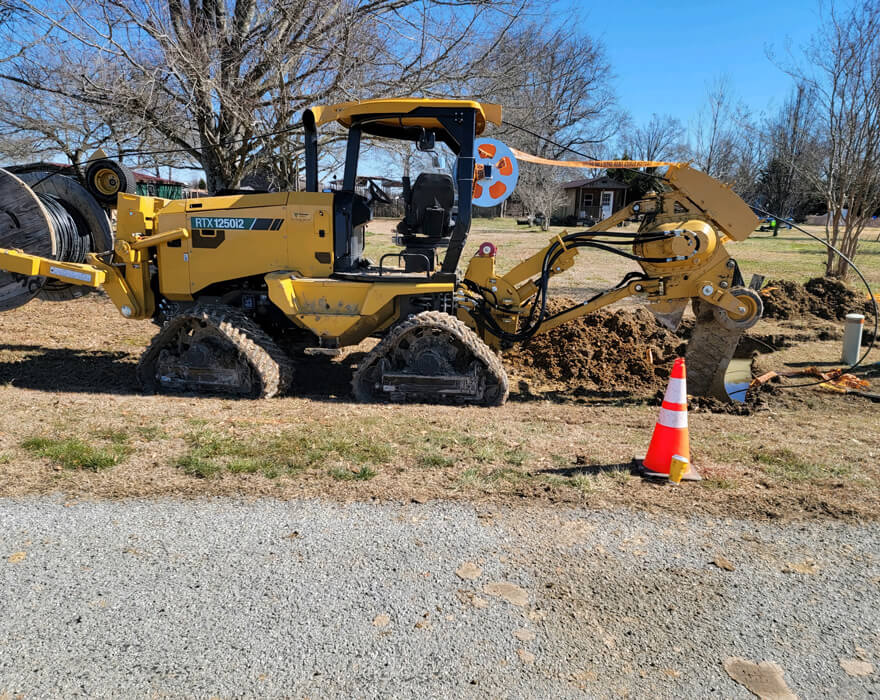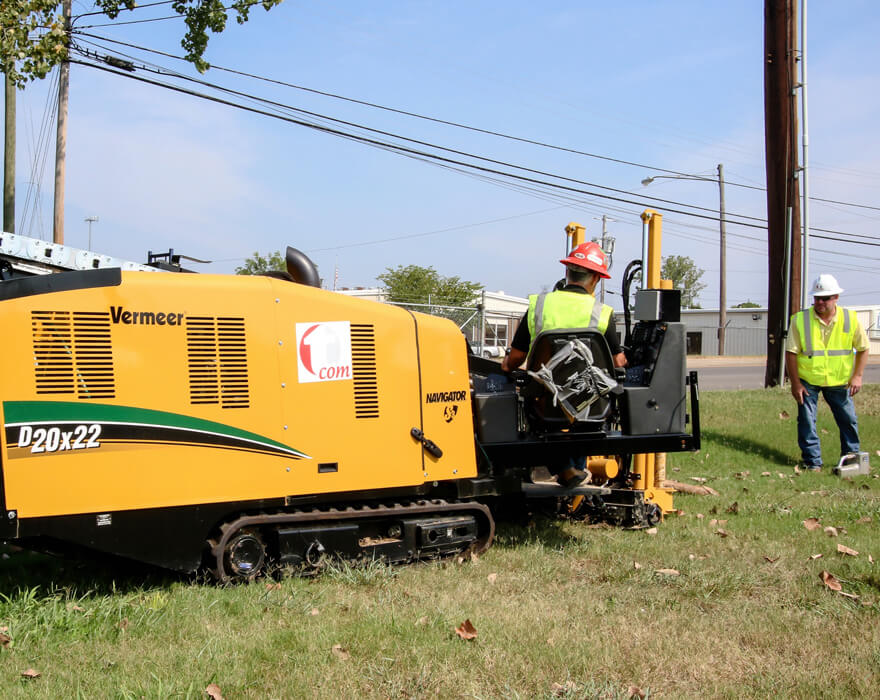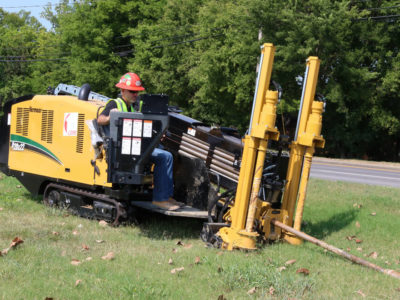5G and access to rural high-speed broadband are in high demand as more companies are adopting new work-from-home policies. Since wireless companies started rolling out 5G in 2018, there is a lot of competition to increase bandwidth speeds, not just over-the-air, but also through hardwired connections to the home. The web, apps and television use more data than just a few short years ago and that means new fiber lines almost everywhere.
Taking on the work
According to Brian Stephens, president of Gallatin, Tennessee-based underground and aerial communication construction company T Com LLC (T Com), there’s no shortage of work out there.
When the COVID-19 pandemic shut down offices and schools in 2020, everyone was sent home to work, fueling the need for greater connectivity and bandwidth. “While there’s been a shortage of employees, material and equipment,” said Stephens, “there’s been no shortage in excitement and intent to build and maintain these high-speed networks. That means there’s a lot of work to do to get the utility infrastructure for these fiber networks installed — and a lot of attention on getting it done as quickly as possible,” he said.
With 5G, the network’s communication signals are transmitted over new radio frequencies. Local and national carriers in charge of building these superfast 5G networks are tasked with installing thousands of small cell sites (each about the size of a pizza box) to light poles, walls or towers, then connecting these cell sites to homes and businesses. This requires aerial installation work like updating radios on cell towers, as well as underground work like laying in new fiber lines. Much of that work is happening in urban areas. But that’s not the only push for faster broadband.
Right now, T Com is being contracted by rural, independent telephone companies all over the Southeast, including current projects in Missouri, Kentucky, Tennessee and Alabama, to help get new broadband networks built. T Com is charged with installing hundreds and hundreds of miles of fiber, while also working with national 5G, and enterprise network providers on other projects.
All the work keeps T Com crews busy. “We offer a full scope of services, including aerial and buried construction, from the beginning of the project to the end, from design engineering, splicing, maintenance and emergency response,” said Stephens. “We also do a lot of remediation-type work after the installations, cleaning everything up and returning jobsites back to normal. When a customer calls us, we can do everything for them. Our company motto is: We’re large enough to perform but small enough to stay engaged.”
As an example, Stephens’ crews are tasked not only with laying new lines, but also restoring roadways, right-of-ways, sidewalks and ditches back to the way they were before the crews got there.
To keep up with the work, T Com employs multiple crews at a time, with a large force of skilled people, and his employees run a variety of utility installation equipment. T Com’s fleet includes Vermeer plows, horizontal directional drills (HDD), vacuum excavators and mini skid steers, as well other equipment like excavators, full-sized skid steers and aerial bucket trucks.

Tools of the trade
One of the tools Stephens has seen a lot more use of on T Com jobs is the company’s mini skid steers, which crews are using to support the work of larger and more specialized trenching and drilling equipment. For instance, T Com crews use a pair of Vermeer CTX100 mini skid steers to score and cut concrete when installing fiber lines in tight areas, such as right up next to residential homes and commercial office buildings.
In rural areas, crews will swap out their micro-trencher attachment, in favor of buckets and Harley rakes to move gravel, dirt and other materials and then smooth out the landscaping. These mini skid steers earn their keep on big projects.
“These mini skid steers cut down on manual labor — crews can use them instead of hand tools and wheelbarrows during site restoration work,” Stephens said. “Having these smaller machines in our fleet, working along with the larger equipment, gives us a lot of flexibility to build these networks.”
Training the workforce
One of T Com’s biggest challenges right now isn’t keeping up with the installation work, it’s hiring and retaining skilled workers. “I can’t remember the last time we didn’t have at least one open position,” he added.
To respond to this need, T Com has a full-time recruiter on staff tasked with attracting new talent. Once hired, new employees work with the company’s seasoned veterans to get trained on the equipment. “We have two guys in particular — one for our aerial work and one for the underground installations — who know how to run every piece of equipment in our fleet,” said Stephens.
“Our underground guy knows how to do everything for burying cable — he’s a good driller, and he knows how to plow. So, when we hire somebody who says they have experience, we send them out with this guy to verify they actually have that skill. He also is great at training people on the job, especially crew members who want to move from a labor-type position to an operator-type position. And on the aerial side, we’ve got a guy that’s just really good at that type of work too. They are our go-tos for in-house training.”
When T Com needs more specialized training, such as adding a new piece of equipment to their fleet, they rely on their dealers’ training programs to get them up and running quickly. For example, when they add a new Vermeer HDD rig, Stephens gets his crew time with Kenny Hartman, Tony Garber and Ryan Van DeCamp at Vermeer Heartland to train them on its features and benefits and operator training. T Com has also sent its crews through the mud school offered by Vermeer to learn about fluid management.
Stephens added, “Although we cross train people on these different types of machines, generally a crew will stay with a specific piece of equipment.” This focus allows the T Com crews to increase their productivity and maximize efficiencies.

Still growing
With 50% company growth in the last year and forecasting another 50% growth in the coming year, Stephens said T Com is at a point now where they are expanding their operations into new territories. “Some of our customers have large footprints and have asked us to move into new geographic areas with them,” he said. “Today, much of the work the company does is still performed by our in-house crews and equipment.”
That said, Stephens added, “T Com does have relationships with a network of reliable subcontractors that do excellent work on our behalf. This strategy allows our company to scale up and down as needed to meet customer demand.”
He finished, “Our commitment to our customers’ work is always our top priority. And whether we do it ourselves or sub it out, everyone who represents the T Com name honors this commitment through integrity and quality — these pillars of our commitment are visible at every level of the company, inside and out.”

This article contains third-party observations, advice or experiences that do not necessarily reflect the opinions of Vermeer Corporation, its affiliates or its dealers. Testimonials and/or endorsements by contractors in specific circumstances may not be representative of normal circumstances experienced by all customers. Vermeer Corporation reserves the right to make changes in engineering, design and specifications; add improvements; or discontinue manufacturing at any time without notice or obligation. Equipment shown is for illustrative purposes only and may display optional accessories or components specific to their global region.
Vermeer and the Vermeer logo are trademarks of Vermeer Manufacturing Company in the U.S. and/or other countries. All other trademarks, registered trademarks and service marks are the property of their respective owners. © 2022 Vermeer Corporation. All Rights Reserved.
